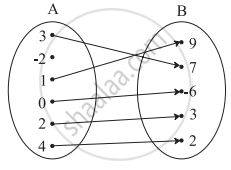Advertisements
Advertisements
प्रश्न
Which sets of ordered pairs represent functions from A = {1, 2, 3, 4} to B = {−1, 0, 1, 2, 3}? Justify.
{(1, 0), (3, 3), (2, −1), (4, 1), (2, 2)}
उत्तर
{(1, 0), (3, 3), (2, –1), (4, 1), (2, 2)} does not represent a function.
Reason:
(2, –1), (2, 2), show that element 2 ∈ A has been assigned two images –1 and 2 from set B.77
APPEARS IN
संबंधित प्रश्न
Let f : R+ → R, where R+ is the set of all positive real numbers, such that f(x) = loge x. Determine
(b) {x : f(x) = −2}
The function f is defined by \[f\left( x \right) = \begin{cases}x^2 , & 0 \leq x \leq 3 \\ 3x, & 3 \leq x \leq 10\end{cases}\]
The relation g is defined by \[g\left( x \right) = \begin{cases}x^2 , & 0 \leq x \leq 2 \\ 3x, & 2 \leq x \leq 10\end{cases}\]
Show that f is a function and g is not a function.
If \[y = f\left( x \right) = \frac{ax - b}{bx - a}\] , show that x = f(y).
Let f and g be two real functions defined by \[f\left( x \right) = \sqrt{x + 1}\] and \[g\left( x \right) = \sqrt{9 - x^2}\] . Then, describe function:
(v) \[\frac{g}{f}\]
If f, g, h are real functions given by f(x) = x2, g(x) = tan x and h(x) = loge x, then write the value of (hogof)\[\left( \sqrt{\frac{\pi}{4}} \right)\] .
If f : R → R and g : R → R are defined by f(x) = 2x + 3 and g(x) = x2 + 7, then the values of x such that g(f(x)) = 8 are
If \[f\left( x \right) = 64 x^3 + \frac{1}{x^3}\] and α, β are the roots of \[4x + \frac{1}{x} = 3\] . Then,
If f(m) = m2 − 3m + 1, find f(−3)
Check if the following relation is a function.

Check if the relation given by the equation represents y as function of x:
x + y2 = 9
If f(m) = m2 − 3m + 1, find f(x + 1)
If f(m) = m2 − 3m + 1, find f(− x)
Find x, if g(x) = 0 where g(x) = `(5x - 6)/7`
Find the domain and range of the following function.
f(x) = `sqrt((x - 3)/(7 - x))`
Find the domain and range of the following function.
f(x) = `sqrt(16 - x^2)`
Express the area A of circle as a function of its circumference C.
Check the injectivity and surjectivity of the following function.
f : Z → Z given by f(x) = x2
Express the following exponential equation in logarithmic form
3–4 = `1/81`
Express the following logarithmic equation in exponential form
ln e = 1
Express the following logarithmic equation in exponential form
In `1/2` = – 0.693
Write the following expression as sum or difference of logarithm
In `(("a"^3 ("a" - 2)^2)/sqrt("b"^2 + 5))`
Prove that alogcb = blogca
Solve for x.
x + log10 (1 + 2x) = x log10 5 + log10 6
Answer the following:
Identify the following relation is the function? If it is a function determine its domain and range.
{(0, 0), (1, 1), (1, –1), (4, 2), (4, –2), (9, 3), (9, –3), (16, 4), (16, –4)}
Answer the following:
Let f: R → R be a function defined by f(x) = 5x3 – 8 for all x ∈ R, show that f is one-one and onto. Hence find f –1
Answer the following:
Let f : R → R be given by f(x) = x + 5 for all x ∈ R. Draw its graph
Answer the following:
If b2 = ac. prove that, log a + log c = 2 log b
Answer the following:
Solve : `sqrt(log_2 x^4) + 4log_4 sqrt(2/x)` = 2
Answer the following:
Find the domain of the following function.
f(x) = x!
Answer the following:
Find the range of the following function.
f(x) = `1/(1 + sqrt(x))`
Given the function f: x → x2 – 5x + 6, evaluate f(x – 1)
The data in the adjacent table depicts the length of a person's forehand and their corresponding height. Based on this data, a student finds a relationship between the height (y) and the forehand length (x) as y = ax + b, where a, b are constant.
| Length ‘x’ of forehand (in cm) |
Height 'y' (in inches) |
| 35 | 56 |
| 45 | 65 |
| 50 | 69.5 |
| 55 | 74 |
Find the length of forehand of a person if the height is 53.3 inches
If f(x) = `(x - 1)/(x + 1), x ≠ - 1` Show that f(f(x)) = `- 1/x`, Provided x ≠ 0
Find the domain of the following functions given by f(x) = `1/sqrt(1 - cos x)`
Find the domain of the following functions given by f(x) = `1/sqrt(x + |x|)`
Find the domain of the following functions given by f(x) = `(x^3 - x + 3)/(x^2 - 1)`
Find the range of the following functions given by f(x) = |x − 3|
The function f: R `rightarrow` R defined by f(x) = sin x is ______.
The domain of f(x) = `sin^-1 [log_2(x/2)]` is ______.
